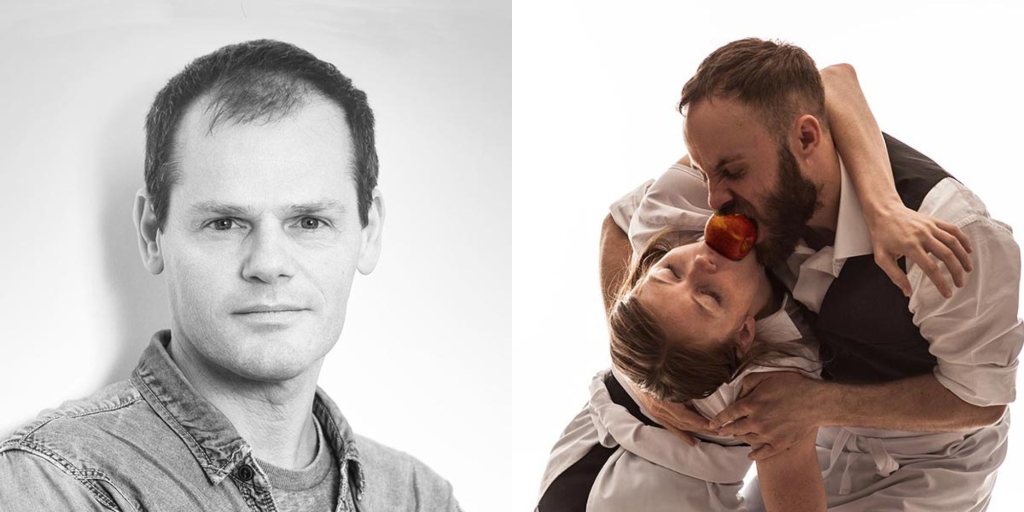May Contain Food: An interview with Luca Silvestrini of Protein Dance Company

Luca Silvestrini, artistic director and founder of the Protein Dance Company, is known for mesmerising his audiences with performances that chronicle social life in dynamic and inventive ways. His 2016 hit May Contain Food is due to premiere online on 12th February 2021, and the event will feature an exciting bonus that will make the experience truly immersive. Luca spoke to us about the making of the show, revealing the driving forces of his personal creative process, and explaining why humour is inherent to everything he does.
How did Protein cope with the challenges brought on by the pandemic? Were there any silver linings for the company?
Like everyone in the industry, our live activities and plans came to a sudden stop, but we did not stop. We decided to be reactive and found creative solutions to complete projects and create new work. We celebrated our 21 years of history by screening pieces from our repertory and by creating new digital content. It felt so important to remain visible, to reach out and keep the artform accessible to many. At times like this, arts and culture have a huge responsibility and we have the means and the resilience to continue to thrive and serve our audiences and participants.
May Contain Food combines a variety of different elements. What attracted you most to the idea of devising a multi-sensory experience?
The idea of an immersive piece around food and eating was what both composer Orlando Gough and I began to think about and explore in 2014, and the following year the show was brought to life. I’ve always been interested in site-responsive, cross-arts and interactive theatre, and May Contain Food offered me the chance to think of a show as an experience for all the senses – not only through smelling, touching and tasting the food, but also by being surrounded by eight voices delivering the entire music and sound score live.
What type of atmosphere did you and Orlando Gough want to create in terms of sound and movement?
We very much wanted to amalgamate movement, words, songs and sounds into one experience. We wanted singers to move and dancers to sing.
May Contain Food included a sit-down meal. When it’s streamed online, this element will be replaced by an even more hands-on opportunity for the audience to feel involved. Can you tell us more about the idea of the tasting menu?
To fully appreciate the screening of May Contain Food, we are inviting and encouraging our online audience to prepare the same tasting menu featured in the show. The four courses were essential parts of the live event, and viewers can still partake in that experience by cooking these amuse-bouche before pressing play, so that touching, smelling and tasting food can still be happening. It’s so exciting to think that people at home can be provoked by food just like the “customers” who came to see the show in theatres around the country back in 2016.
Sharing a meal has such strong cultural significance as a communal act. What intrigues you most about food and the eating experience?
Exactly that. Food plays such a big role all the way through our lives. It is both a pleasure and a struggle, a need and a substitute; you are what you eat and you eat what you are. There are also ethical and political strings attached to this. The show celebrates and stimulates discussion around our complex relationship with food and eating, and we’ve chosen to seat people around a table to enjoy and reflect.
Your work has been described as a “surreal experience”. To what extent do you consider breaking boundaries and deconstructing reality to be important parts of the creative process?
My work mostly starts from diverse lived experiences and my own views and urges. By inviting performers and collaborators to approach the scrutinised themes from their perspectives, experiences and set of values, I wish to create space for debate and a possibility to go beyond my own initial thoughts and experiences. I am not sure at what point the real becomes surreal; putting something onstage usually magnifies the real – a person becomes a character – but we also know that life itself can often appear more surreal than theatre.
Humour is central to your work. Do you intend it to be satirical, or does it express a desire for lightheartedness?
Humour and satire are never intended: they come naturally and help me to tell stories and treat a subject matter. I often get told that I have a very unique and effective way of dealing with heavy stuff in a lighthearted way. I am pleased if this is what comes across but it is not a desire, it’s perhaps just the way I operate.
Since the pandemic, you have (digitally) revived some of your most successful productions of the past. Did looking back prompt reflections on your career so far? What are you most proud of?
It has been fascinating and hugely satisfying to revisit and reconnect with past work and the people who brought it to life. I am so proud of the whole journey and its amazing travellers. Each piece, and each cast and working team, has come out and marked every moment of my career and my life.
Are there any themes or concepts that you would like to explore further in future? Do you have any projects in the pipeline?
I have already started some research and development into gender identity, but I am currently focusing on an outdoor experiential piece, which will premiere this summer.
What would you like to see more of in the world of dance?
I am very interested in seeing dancers return to dance and live work. I am equally interested in how we can continue to engage distant and isolated audiences and communities using the skills and resilience we have acquired.
Mersa Auda
For further information about Protein Dance Company and future events visit here.

























Facebook
Twitter
Instagram
YouTube
RSS